- Home
- Edith Wharton
The Fruit of the Tree Page 9
The Fruit of the Tree Read online
Page 9
IX
"BUT, Justine----"
Mrs. Harry Dressel, seated in the June freshness of her Oak Streetdrawing-room, and harmonizing by her high lights and hard edges with thewhite-and-gold angularities of the best furniture, cast a rebuking eyeon her friend Miss Brent, who stood arranging in a glass bowl thehandful of roses she had just brought in from the garden.
Mrs. Dressel's intonation made it clear that the entrance of Miss Brenthad been the signal for renewing an argument which the latter hadperhaps left the room to escape.
"When you were here three years ago, Justine, I could understand yournot wanting to go out, because you were in mourning for your mother--andbesides, you'd volunteered for that bad surgical case in the HopeHospital. But now that you've come back for a rest and a change I can'timagine why you persist in shutting yourself up--unless, of course," sheconcluded, in a higher key of reproach, "it's because you think solittle of Hanaford society----"
Justine Brent, putting the last rose in place, turned from her task witha protesting gesture.
"My dear Effie, who am I to think little of any society, when I belongto none?" She passed a last light touch over the flowers, and crossingthe room, brushed her friend's hand with the same caressing gesture.
Mrs. Dressel met it with an unrelenting turn of her plump shoulder,murmuring: "Oh, if you take _that_ tone!" And on Miss Brent's gailyrejoining: "Isn't it better than to have other people take it for me?"she replied, with an air of affront that expressed itself in a rufflingof her whole pretty person: "If you'll excuse my saying so, Justine, thefact that you are staying with _me_ would be enough to make you welcomeanywhere in Hanaford!"
"I'm sure of it, dear; so sure that my horrid pride rather resents beingfloated in on the high tide of such overwhelming credentials."
Mrs. Dressel glanced up doubtfully at the dark face laughing down onher. Though she was president of the Maplewood Avenue Book-club, andhabitually figured in the society column of the "Banner" as one of theintellectual leaders of Hanaford, there were moments when herself-confidence trembled before Justine's light sallies. It was absurd,of course, given the relative situations of the two; and Mrs. Dressel,behind her friend's back, was quickly reassured by the thought thatJustine was only a hospital nurse, who had to work for her living, andhad really never "been anywhere"; but when Miss Brent's verbal arrowswere flying, it seemed somehow of more immediate consequence that shewas fairly well-connected, and lived in New York. No one placed a highervalue on the abstract qualities of wit and irony than Mrs. Dressel; thedifficulty was that she never quite knew when Justine's retorts wereloaded, or when her own susceptibilities were the target aimed at; andbetween her desire to appear to take the joke, and the fear of beingridiculed without knowing it, her pretty face often presented aninteresting study in perplexity. As usual, she now took refuge inbringing the talk back to a personal issue.
"I can't imagine," she said, "why you won't go to the Gaines'sgarden-party. It's always the most brilliant affair of the season; andthis year, with the John Amhersts here, and all their party--thatfascinating Mrs. Eustace Ansell, and Mrs. Amherst's father, old Mr.Langhope, who is quite as quick and clever as _you_ are--you certainlycan't accuse us of being dull and provincial!"
Miss Brent smiled. "As far as I can remember, Effie, it is always youwho accuse others of bringing that charge against Hanaford. For my part,I know too little of it to have formed any opinion; but whatever it mayhave to offer me, I am painfully conscious of having, at present,nothing but your kind commendation to give in return."
Mrs. Dressel rose impatiently. "How absurdly you talk! You're a littlethinner than usual, and I don't like those dark lines under your eyes;but Westy Gaines told me yesterday that he thought you handsomer thanever, and that it was intensely becoming to some women to lookover-tired."
"It's lucky I'm one of that kind," Miss Brent rejoined, between a sighand a laugh, "and there's every promise of my getting handsomer everyday if somebody doesn't soon arrest the geometrical progression of mygood looks by giving me the chance to take a year's rest!"
As she spoke, she stretched her arms above her head, with a gesturerevealing the suppleness of her slim young frame, but also its tenuityof structure--the frailness of throat and shoulders, and the play ofbones in the delicate neck. Justine Brent had one of those imponderablebodies that seem a mere pinch of matter shot through with light andcolour. Though she did not flush easily, auroral lights ran under herclear skin, were lost in the shadows of her hair, and broke again in hereyes; and her voice seemed to shoot light too, as though her smileflashed back from her words as they fell--all her features being sofluid and changeful that the one solid thing about her was the massingof dense black hair which clasped her face like the noble metal of someantique bust.
Mrs. Dressel's face softened at the note of weariness in the girl'svoice. "Are you very tired, dear?" she asked drawing her down to a seaton the sofa.
"Yes, and no--not so much bodily, perhaps, as in spirit." Justine Brentdrew her brows together, and stared moodily at the thin brown handsinterwoven between Mrs. Dressel's plump fingers. Seated thus, withhollowed shoulders and brooding head, she might have figured a youngsibyl bowed above some mystery of fate; but the next moment her face,inclining toward her friend's, cast off its shadows and resumed the lookof a plaintive child.
"The worst of it is that I don't look forward with any interest totaking up the old drudgery again. Of course that loss of interest may bemerely physical--I should call it so in a nervous patient, no doubt. Butin myself it seems different--it seems to go to the roots of the world.You know it was always the imaginative side of my work that helped meover the ugly details--the pity and beauty that disinfected the physicalhorror; but now that feeling is lost, and only the mortal disgustremains. Oh, Effie, I don't want to be a ministering angel any more--Iwant to be uncertain, coy and hard to please. I want something dazzlingand unaccountable to happen to me--something new and unlived andindescribable!"
She snatched herself with a laugh from the bewildered Effie, andflinging up her arms again, spun on a light heel across the polishedfloor.
"Well, then," murmured Mrs. Dressel with gentle obstinacy, "I can't seewhy in the world you won't go to the Gaines's garden-party!" And caughtin the whirlwind of her friend's incomprehensible mirth, she stillpersisted, as she ducked her blonde head to it: "If you'll only let melend you my dress with the Irish lace, you'll look smarter than anybodythere...."
* * * * *
Before her toilet mirror, an hour later, Justine Brent seemed in a wayto fulfill Mrs. Dressel's prediction. So mirror-like herself, she couldno more help reflecting the happy effect of a bow or a feather than thesubtler influence of word and look; and her face and figure were so newto the advantages of dress that, at four-and-twenty, she still producedthe effect of a young girl in her first "good" frock. In Mrs. Dressel'sfestal raiment, which her dark tints subdued to a quiet elegance, shewas like the golden core of a pale rose illuminating and scenting itspetals.
Three years of solitary life, following on a youth of confidentialintimacy with the mother she had lost, had produced in her the quainthabit of half-loud soliloquy. "Fine feathers, Justine!" she laughed backat her laughing image. "You look like a phoenix risen from your ashes.But slip back into your own plumage, and you'll be no more than a littlebrown bird without a song!"
The luxurious suggestions of her dress, and the way her warm youthbecame it, drew her back to memories of a childhood nestled in beautyand gentle ways, before her handsome prodigal father had died, and hermother's face had grown pinched in the long struggle with poverty. Butthose memories were after all less dear to Justine than the grey yearsfollowing, when, growing up, she had helped to clear a space in thewilderness for their tiny hearth-fire, when her own efforts had fed theflame and roofed it in from the weather. A great heat, kindled at thathearth, had burned in her veins, making her devour her work, lightingand warming the long cold days, and reddening the
horizon through darkpassages of revolt and failure; and she felt all the more deeply thechill of reaction that set in with her mother's death.
She thought she had chosen her work as a nurse in a spirit of highdisinterestedness; but in the first hours of her bereavement it seemedas though only the personal aim had sustained her. For a while, afterthis, her sick people became to her mere bundles of disintegratingmatter, and she shrank from physical pain with a distaste the deeperbecause, mechanically, she could not help working on to relieve it.Gradually her sound nature passed out of this morbid phase, and she tookup her task with deeper pity if less exalted ardour; glad to do her partin the vast impersonal labour of easing the world's misery, but longingwith all the warm instincts of youth for a special load to lift, asingle hand to clasp.
Ah, it was cruel to be alive, to be young, to bubble with springs ofmirth and tenderness and folly, and to live in perpetual contact withdecay and pain--to look persistently into the grey face of death withouthaving lifted even a corner of life's veil! Now and then, when she felther youth flame through the sheath of dullness which was graduallyenclosing it, she rebelled at the conditions that tied a spirit likehers to its monotonous task, while others, without a quiver of wings ontheir dull shoulders, or a note of music in their hearts, had the wholewide world to range through, and saw in it no more than a frightfulemptiness to be shut out with tight walls of habit....
* * * * *
A tap on the door announced Mrs. Dressel, garbed for conquest, andbestowing on her brilliant person the last anxious touches of the artistreluctant to part from a masterpiece.
"My dear, how well you look! I _knew_ that dress would be becoming!" sheexclaimed, generously transferring her self-approval to Justine; andadding, as the latter moved toward her: "I wish Westy Gaines could seeyou now!"
"Well, he will presently," Miss Brent rejoined, ignoring the slightstress on the name.
Mrs. Dressel continued to brood on her maternally. "Justine--I wishyou'd tell me! You say you hate the life you're leading now--but isn'tthere somebody who might----?"
"Give me another, with lace dresses in it?" Justine's slight shrug mighthave seemed theatrical, had it not been a part of the ceaseless dramaticplay of her flexible person. "There might be, perhaps...only I'm notsure--" She broke off whimsically.
"Not sure of what?"
"That this kind of dress might not always be a little tight on theshoulders."
"Tight on the shoulders? What do you mean, Justine? My clothes simply_hang_ on you!"
"Oh, Effie dear, don't you remember the fable of the wings under theskin, that sprout when one meets a pair of kindred shoulders?" And, asMrs. Dressel bent on her a brow of unenlightenment--"Well, it doesn'tmatter: I only meant that I've always been afraid good clothes mightkeep my wings from sprouting!" She turned back to the glass, givingherself a last light touch such as she had bestowed on the roses.
"And that reminds me," she continued--"how about Mr. Amherst's wings?"
"John Amherst?" Mrs. Dressel brightened into immediate attention. "Why,do you know him?"
"Not as the owner of the Westmore Mills; but I came across him as theirassistant manager three years ago, at the Hope Hospital, and he wasstarting a very promising pair then. I wonder if they're doing as wellunder his new coat."
"I'm not sure that I understand you when you talk poetry," said Mrs.Dressel with less interest; "but personally I can't say I like JohnAmherst--and he is certainly not worthy of such a lovely woman as Mrs.Westmore. Of course she would never let any one see that she's notperfectly happy; but I'm told he has given them all a great deal oftrouble by interfering in the management of the mills, and his manner isso cold and sarcastic--the truth is, I suppose he's never quite at easein society. _Her_ family have never been really reconciled to themarriage; and Westy Gaines says----"
"Ah, Westy Gaines _would_," Justine interposed lightly. "But if Mrs.Amherst is really the Bessy Langhope I used to know it must be rather astruggle for the wings!"
Mrs. Dressel's flagging interest settled on the one glimpse of fact inthis statement. "It's such a coincidence that you should have known hertoo! Was she always so perfectly fascinating? I wish I knew how shegives that look to her hair!"
Justine gathered up the lace sunshade and long gloves which her friendhad lent her. "There was not much more that was genuine about hercharacter--that was her very own, I mean--than there is about myappearance at this moment. She was always the dearest little chameleonin the world, taking everybody's colour in the most flattering way, andgiving back, I must say, a most charming reflection--if you'll excusethe mixed metaphor; but when one got her by herself, with no reflectionsto catch, one found she hadn't any particular colour of her own. One ofthe girls used to say she ought to wear a tag, because she was so easilymislaid---- Now then, I'm ready!"
Justine advanced to the door, and Mrs. Dressel followed her downstairs,reflecting with pardonable complacency that one of the disadvantages ofbeing clever was that it tempted one to say sarcastic things of otherwomen--than which she could imagine no more crying social error.
During the drive to the garden-party, Justine's thoughts, drawn to thepast by the mention of Bessy Langhope's name, reverted to the comicinconsequences of her own lot--to that persistent irrelevance ofincident that had once made her compare herself to an actor alwaysplaying his part before the wrong stage-setting. Was there not, forinstance, a mocking incongruity in the fact that a creature so leapingwith life should have, for chief outlet, the narrow mental channel ofthe excellent couple between whom she was now being borne to the Gainesgarden-party? All her friendships were the result of propinquity or ofearly association, and fate had held her imprisoned in a circle ofwell-to-do mediocrity, peopled by just such figures as those of thekindly and prosperous Dressels. Effie Dressel, the daughter of a cousinof Mrs. Brent's, had obscurely but safely allied herself with the heavyblond young man who was to succeed his father as President of the UnionBank, and who was already regarded by the "solid business interests" ofHanaford as possessing talents likely to carry him far in thedevelopment of the paternal fortunes. Harry Dressel's honest countenancegave no evidence of peculiar astuteness, and he was in fact rather theproduct of special conditions than of an irresistible bent. He had thesound Saxon love of games, and the most interesting game he had everbeen taught was "business." He was a simple domestic being, andaccording to Hanaford standards the most obvious obligation of thehusband and father was to make his family richer. If Harry Dressel hadever formulated his aims, he might have said that he wanted to be theman whom Hanaford most respected, and that was only another way ofsaying, the richest man in Hanaford. Effie embraced his creed with azeal facilitated by such evidence of its soundness as a growing incomeand the early prospects of a carriage. Her mother-in-law, a kind oldlady with a simple unquestioning love of money, had told her on herwedding day that Harry's one object would always be to make his familyproud of him; and the recent purchase of the victoria in which Justineand the Dressels were now seated was regarded by the family as astriking fulfillment of this prophecy.
In the course of her hospital work Justine had of necessity run acrossfar different types; but from the connections thus offered she was oftenheld back by the subtler shades of taste that civilize humanintercourse. Her world, in short, had been chiefly peopled by the dullor the crude, and, hemmed in between the two, she had created forherself an inner kingdom where the fastidiousness she had to set asidein her outward relations recovered its full sway. There must be actualbeings worthy of admission to this secret precinct, but hitherto theyhad not come her way; and the sense that they were somewhere just out ofreach still gave an edge of youthful curiosity to each encounter with anew group of people.
Certainly, Mrs. Gaines's garden-party seemed an unlikely field for theexercise of such curiosity: Justine's few glimpses of Hanaford societyhad revealed it as rather a dull thick body, with a surface stimulatedonly by ill-advised references to the life of larger
capitals; and theconcentrated essence of social Hanaford was of course to be found at theGaines entertainments. It presented itself, however, in the rich Juneafternoon, on the long shadows of the well-kept lawn, and among thepaths of the rose-garden, in its most amiable aspect; and to Justine,wearied by habitual contact with ugliness and suffering, there was puredelight in the verdant setting of the picture, and in the lightharmonious tints of the figures peopling it. If the company was dull, itwas at least decorative; and poverty, misery and dirt were shut out bythe placid unconsciousness of the guests as securely as by the leafybarriers of the garden.

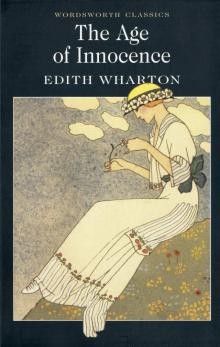 The Age of Innocence
The Age of Innocence The Reef
The Reef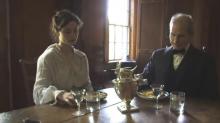 Summer
Summer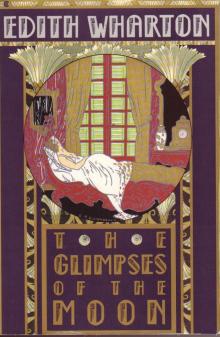 The Glimpses of the Moon
The Glimpses of the Moon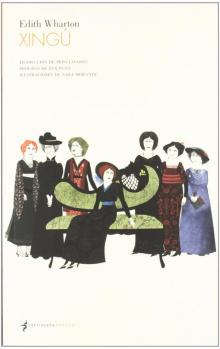 Xingu
Xingu The Fruit of the Tree
The Fruit of the Tree Fast and Loose
Fast and Loose Artemis to Actaeon and Other Verse
Artemis to Actaeon and Other Verse The Line of Least Resistance
The Line of Least Resistance The Lamp of Psyche
The Lamp of Psyche The Reckoning
The Reckoning Afterward
Afterward The New York Stories of Edith Wharton
The New York Stories of Edith Wharton The 2014 Halloween Horrors Megapack
The 2014 Halloween Horrors Megapack 'Copy': A Dialogue
'Copy': A Dialogue The Recovery
The Recovery The Fulness of Life
The Fulness of Life Early Short Stories Vol. 1
Early Short Stories Vol. 1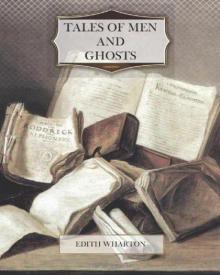 Tales of Men and Ghosts
Tales of Men and Ghosts The House of the Dead Hand
The House of the Dead Hand That Good May Come
That Good May Come The Buccaneers
The Buccaneers Other Times, Other Manners
Other Times, Other Manners The Hermit and the Wild Woman
The Hermit and the Wild Woman Kerfol
Kerfol The Duchess at Prayer
The Duchess at Prayer Bunner Sisters
Bunner Sisters The Choice
The Choice Madame De Treymes
Madame De Treymes Ethan Frome, Summer, Bunner Sisters
Ethan Frome, Summer, Bunner Sisters In Morocco
In Morocco The Valley of Decision
The Valley of Decision Age of Innocence (Barnes & Noble Classics Series)
Age of Innocence (Barnes & Noble Classics Series) The Angel at the Grave
The Angel at the Grave April Showers
April Showers Sanctuary
Sanctuary The Bunner Sisters
The Bunner Sisters Mrs. Manstey's View
Mrs. Manstey's View Writing a War Story
Writing a War Story The Custom of the Country
The Custom of the Country In Trust
In Trust The Triumph of the Night
The Triumph of the Night The Hermit and the Wild Woman, and Other Stories
The Hermit and the Wild Woman, and Other Stories Roman Fever and Other Stories
Roman Fever and Other Stories The Mission of Jane
The Mission of Jane The Descent of Man and Other Stories
The Descent of Man and Other Stories Coming Home
Coming Home The Touchstone
The Touchstone Early Short Stories Vol. 2
Early Short Stories Vol. 2 Edith Wharton's Verse, 1879-1919, from various journals.
Edith Wharton's Verse, 1879-1919, from various journals.